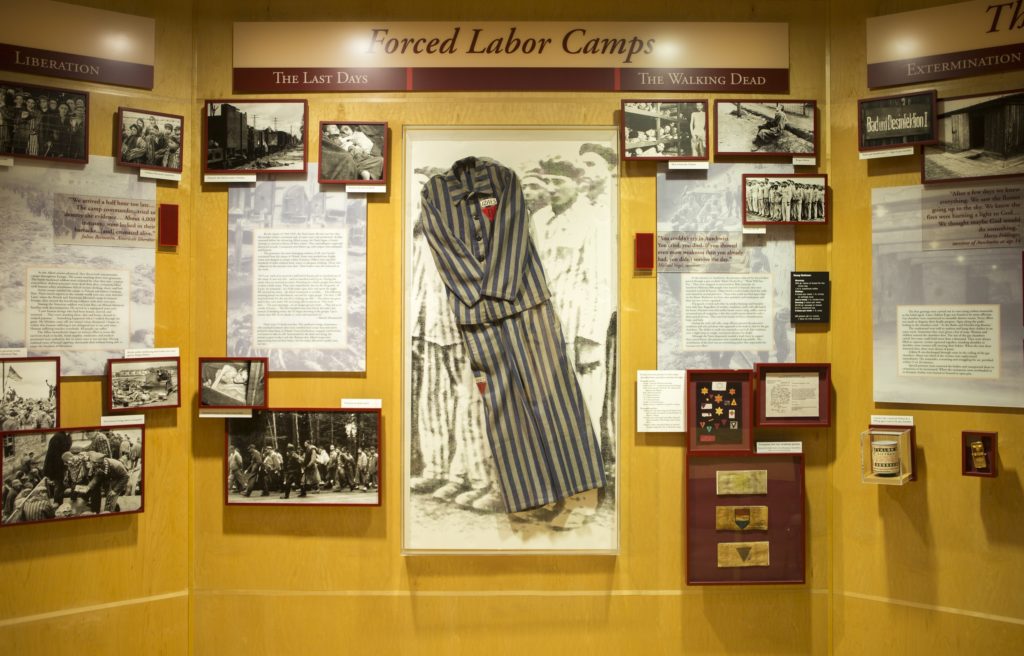
Many of us are familiar with the word “bystander,” but less are familiar with the term “upstander.” The mission of the Holocaust Memorial Museum of San Antonio (HMMSA) is to change this unawareness in South Texas. We have Holocaust education resources to help families answer the question, “How do I begin to tell my child about the Holocaust?”
Next week, January 25–29, 2021, is the annual week designated as Texas Holocaust Remembrance Week. This second annual week of remembrance mandates Holocaust education in all Texas public school K–12 curriculum. This assigned week is a result of Senate Bill 1828, championed by local docents of the museum and children of Holocaust survivors. Texas State Senator José Menéndez carried the legislation with bipartisan co-sponsorship, passing with 100 percent progression.
Teachings Kids to Be Upstanders
But what does Holocaust education actually mean when it comes to teaching this difficult and complex subject matter in the K–12 classroom? First, it is important to note, Holocaust education is not solely about the teaching of historical facts and data. To presume that any 5-year-old kindergarten student would be required to memorize these details, or to be exposed to the adult concepts and deep emotions triggered by this subject matter, is simply not the case. Holocaust education to our youngest students is about providing a foundation of themes of empathy and citizenry upon which to teach the heavier and more mature content in later years. This is where the HMMSA presents the concept of promoting upstanders.
Nobel laureate and Holocaust survivor Elie Wiesel once explained that “The opposite of love is not hate, it’s indifference.” In looking back at the atrocities of the Holocaust, many survivors, as well as numerous scholars, have posed the question, “What if the world’s citizens weren’t indifferent to the evils committed by the Nazis?” What if people did not simply stand by and hope that someone else addressed their concern? What if more people chose to be upstanders?
Being an upstander is not instinctive. Learning to be an upstander requires specific instruction, guidance, and coaching on how and when someone needs to step up and intervene if they see something wrong taking place in their presence. This is a critical lesson we should be teaching our children at all ages.
Age Appropriate Ways to Teach Tolerance
Many parents often find themselves criticizing schools and holding school administrators and faculty accountable for the increased incidents of bullying behaviors on campus, as well as online through social media. To be clear, the HMMSA does not equate the Nazis’ actions to school bullying. There is a dramatic difference between the actions of mature, accountable, decision-making adults and immature, poorly behaving children. Yet, behaviors are typically learned, and where negative behaviors do not receive consequences, they can become reinforced and eventually grow into the misguided actions of adults.
The Teaching Tolerance website has great lessons for all ages on helping our children understand social justice and diversity, including a specific lesson for students in grades 6–12 that contrasts bullying behaviors with bystanders, and the HMMSA website has numerous resources on Holocaust education, including an up-to-date book list for children in grades K–5 as well as extensive educator resources.
But, teaching tolerance and exposing children to the historical facts and real-life experiences of those who lived through the Holocaust, both from the perspective of the survivors as well as the liberators of the camps, only scratches the surface of wrestling with this subject matter. Many adults avoid the topic because they simply do not know where to begin, or how to approach the subject with their children. Many teachers teach the facts and the figures because those are easier to assess for evaluation. But schools who focus on teaching the children to be upstanders develop a supportive culture and compassionate environment where empathy becomes the norm.

Resources for Teaching the History of the Holocaust
The HMMSA is currently offering virtual tours of all its in-person exhibits. Teachers have easy, centralized access to multiple Holocaust-themed resources, including the opportunity to reserve and checkout classroom traveling exhibits and classroom curriculum trunks in both English and Spanish, and to easily download lesson plan worksheets for students in middle and high school. Also, the HMMSA recently partnered with the San Antonio Public Library to make the annual January program Learn & Remember available online, including an extraordinary exhibit titled “Isolation.”
Finally, as part of this year’s Texas Holocaust Remembrance Week, for our older students and adults, the HMMSA is offering, through a generous grant from the Texas Holocaust & Genocide Commission, two live presentations every day next week, as well as an additional pre-recorded presentation uploaded each day for convenient access for any class’s daily schedule. The schedules for all the presentations can be found online, including a special video welcome from Texas State Senator José Menéndez briefly explaining the background behind Texas Holocaust Remembrance Week and the upstanding behavior of four local San Antonio residents who helped lead the way to SB 1828.
These resources give parents and schools a set of age appropriate materials for teaching children about the Holocaust. For more information, or to schedule your virtual museum tour, go to HMMSA.org, or email info@HMMSA.org.
The Holocaust Memorial Museum is a program of the Jewish Federation of San Antonio located at 12500 NW Military Hwy, San Antonio, TX 78231 (map). While museum is closed to in-person visits during the pandemic, all resources, including tours, educator guides, and Survivor testimonies are available online.
Charter Moms Chats
Watch Nammie Ichilov, CEO of the Jewish Federation of San Antonio and Director of the Holocaust Memorial Museum of San Antonio (HMMSA), speak with Inga Cotton on Charter Moms Chats on January 22, 2021 at 4 PM Central live on Facebook and YouTube.
Read More About Being an Upstander
- “Never Too Old or Too Young to Learn”—Wendy Gonzales-Neal of My Child My Voice”, Wendy Gonzales-Neal, San Antonio Charter Moms, December 16, 2020
- “Fighting Cyberbullying in the Age of Distance Learning,” San Antonio Charter Moms, September 23, 2020
- “Comments on Education: Senator José Menéndez and the San Antonio Hispanic Chamber of Commerce,” San Antonio Charter Moms, September 20, 2017
